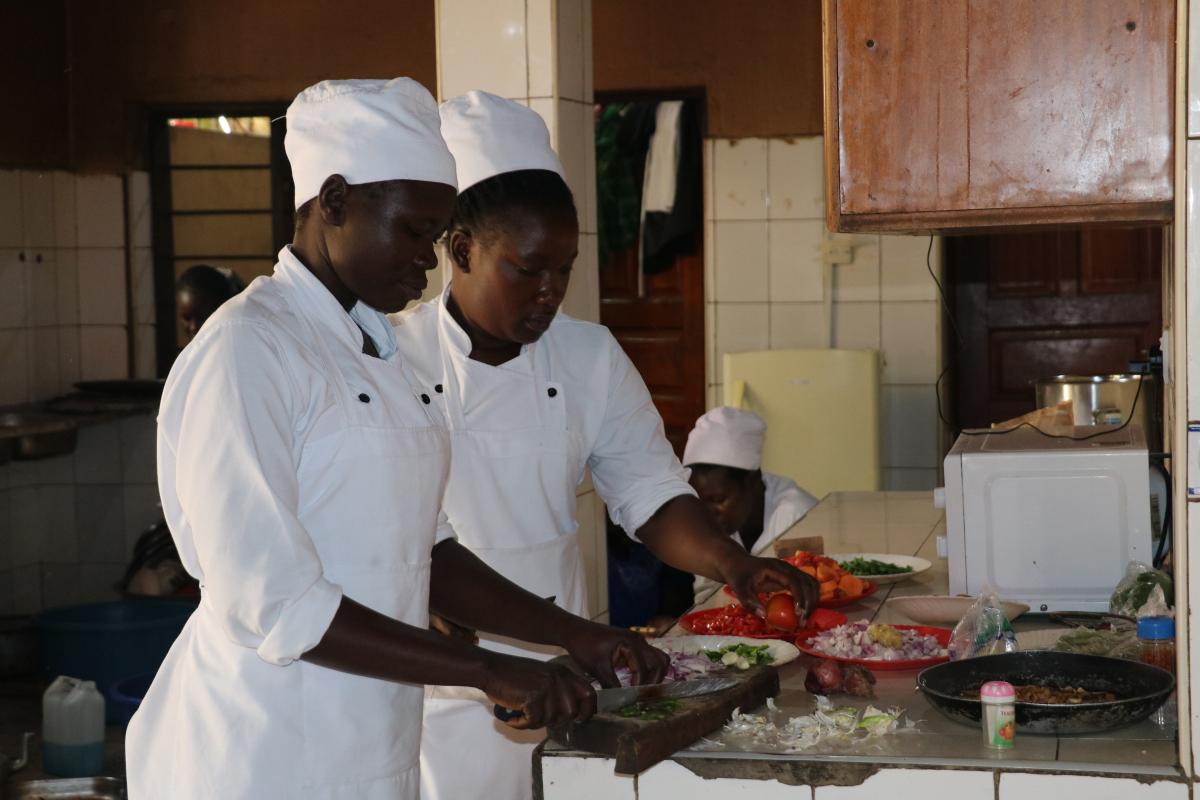Catering classes light up the future for two orphans
Heritage
Hotel in Arua district, West Nile region, is a beehive of activity. There is a meeting
going on, and the waiters and waitresses are busy setting up tea for the
participants.
Hotels in Arua have been very busy these past couple of years, a
situation catalyzed by the high influx of refugees from South Sudan that has seen
both international and national humanitarian organisations set up shop in the
area or expand operations, with the resultant increased number of staff as well
as programme operations.
This hotel
is the venue of 27-year-old Farida Zawadi’s apprenticeship. An
apprenticeship is a system of
training practitioners on a trade or profession with on-the-job training and
often some accompanying study (classroom work and reading).
Zawadi, a
Ugandan national, dropped out of school in Senior Three because her elder
brother, who had been paying her school fees since the death of their father,
was no longer able to foot them. He had got a family and children of his own to
take care of.
Zawadi spent
the last five years out of school, during which time she fell pregnant and got
a son. The fact that she had got a dependent meant that she had to look for a
source of income to take care of herself and her child.
“I have been
helping to run my sister’s salon, and in turn I get money to pay my son’s
school fees,” she says.
Zawadi got a
second chance at education with the EUTF-funded SPRS-NU programme which,
working with Enabel, the Belgian development agency, is running a Skills
Development and Entrepreneurship Training programme that focuses on equipping
youth, including women and girls, with skills that can enable them get
employment or start their own jobs.
She enrolled
through the Centre for Governance and Economic Development (CEGED), a local non-governmental
organization, that received funding from Enabel to carry out skills development
for youth.
Skills development is offered
through formal and non-formal institutional training, apprenticeship, and instant
training.
Zawadi’s
trainer, Chef Johns Kafeero, who has been in the hotel business for 38 years, thinks
apprenticeship is a strategic training mode for unemployed youth.
“When a
young person is trained from a workplace, they get first-hand experience. Besides
learning how to prepare different foods and beverages, both hot and cold, they are
exposed to customers and how to serve and meet their needs,” he says.
Indeed
Zawadi attests to the fact that she is now an expert at preparing different
kinds of meals, including those she had never cooked before at home or even
tasted.
And it is
these skills that she hopes to use to change her life, approaching this with an
entrepreneurial outlook.
“I would
like to go out and start my own catering business,” she says. “I do not have
the capital for this now, so I am first going to get a job, save my earnings
and open my own business.”
Like Zawadi,
death also robbed 25-year-old Lillian Yesco of her father, leading her to drop
out of school in Senior Three. Having spent four years at home without
enrolling in school, Yesco was excited to hear about the skills development
programme and enroll on it.
“It would
give me a chance to not only make something of myself, but to also take care of
my siblings,” she says.
Yesco’s six
siblings are in primary school, a feat they manage by doing odd jobs to raise
their own school fees. During the holidays and sometimes in the evenings after
school, they dig in neighbours’ gardens at a fee, and also grow cassava,
sorghum and simsim on the family land
for sale.
“They are
too young to take care of themselves, but for now they do not have a
choice. When I start working, all that will be no more,” she says hopefully.
So Yesco is
now an expert at baking, taking delight in making queen cakes, cookies,
chapatti and mandazi. She has also learnt how to prepare dishes such as beef
and chicken stew, which are quite popular with customers in the area.
About the programme
Zawadi and
Yesco are young Ugandan women benefiting from the Support Programme for Refugee
Settlements in Northern Uganda. Funded through the European Union Emergency
Trust Fund for Refugees, the programme not only seeks to change the livelihoods
of refugees but also those Ugandans/host communities who live within and around
the refugee settlements in Northern Uganda and Kiryandongo in adherence to the
Refugee and Host Population Empowerment (ReHoPE) strategy.
Dernières actualité de ce projet
Pas d'actualité

